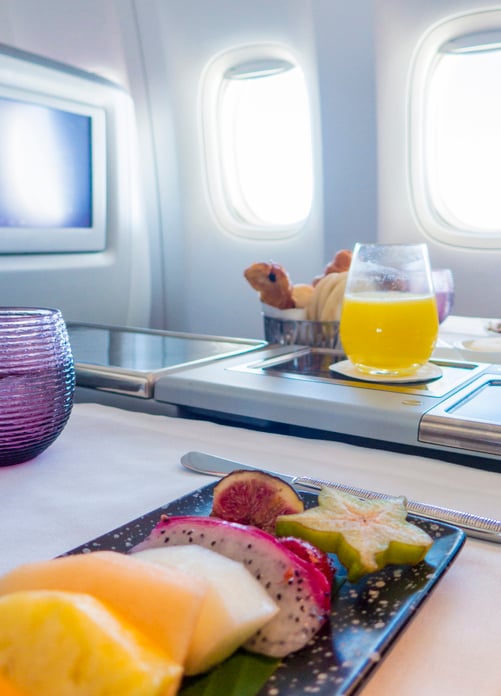If you have flown across time zones then chances are you have experienced jetlag. Jet lag symptoms are not only uncomfortable, but sometimes debilitating, with the first few days of an overseas trip usually disrupted by gastrointestinal issues (e.g. bloating, constipation and diarrhoea), extreme fatigue in the day or alertness at night, headaches, and generally not feeling well. Reducing (or preventing) jet lag is the goal of most flyers, with light exposure, exercise, and supplements often suggested as strategies. But what about the foods we eat? Can diet reduce jetlag?
First of all, what causes jet lag?
Jetlag is caused when our circadian rhythms (e.g. the body’s sleep/wake cycles) are out of sync with the new time zone a person lands in. Our body clocks get confused with what time it is as the new environment is different to what our body is expecting e.g. I land in the UK in the morning and the sun is shining but my body clock thinks it is nighttime as that is the time in Australia where I just flew from. Our body clocks help set our circadian rhythms, which in turn determine our sleep/wake patterns. So essentially jetlag occurs when there is a misalignment of circadian rhythms with the day/night cycle.
But the good news is this misalignment isn’t permanent. Our body clocks can adapt to new time zones and our circadian rhythms can become realigned with the day/night cycle. But how does this happen? There are external environmental cues that our body clocks respond to and can influence the resyncing of circadian rhythms. The main external cue that affects our master body clock is light, which is why one of the main recommendations for helping to get over jet lag is to get outside in the sunshine at the new destination. However, there are other factors which can affect the smaller body clocks (peripheral clocks) and one of these includes eating. So, this is opens up the fascinating question – can diet, or foods, help reduce jetlag? While there is no anti-jetlag diet as yet, there are cues from the science of chrononutrition which help point us to where diet could be useful in reducing or preventing symptoms of jet lag.
How foods help with jet lag?
Making changes to the foods we eat when we fly, and once we land, can help reduce the gastrointestinal symptoms caused by jet lag, support circadian realignment and help reduce metabolic effects of eating when the body thinks it is night. While light is the most important factor to help the master body clock realign, eating at the right time can help the peripheral body clocks involved in our gastrointestinal system align with the master clock. It is also important to consider the carbohydrate and protein content of meals when flying across time zones as the body metabolises foods differently at night compared to the day. Foods/meals rich in carbohydrates seem to have more of an impact on blood sugar levels when eaten at night (or when the body thinks it is night), compared to the day. Even low GI foods seem to lose their glycemic benefit when eaten at night. Adding protein to meals can help reduce the effect of eating carbohydrates at night.
Tips for using foods and diet to help reduce jet lag and prevent jet lag symptoms:
- When you arrive at your destination eat meals according to the new time zone
- Have small, balanced meals for the first 1-2 days after your land
- Avoid eating large amounts of refined carbohydrates while flying and 1-2 days after you land
- Avoid large, heavy meals when your body thinks it is night time both while flying and 1-2 days after you land
- Drink plenty of water and stay hydrated while flying
- Focus on having good gut health before you travel to help reduce the chance of being bloated and constipated before flying
- Avoid foods known to cause bloating while flying and 1-2 days after landing
- If you are shifting your waking/sleep habits to the new time zone before or during your flight, don’t forget to shift your eating habits to the new time zone as well.
- Plan ahead – be familiar with the time zone you will be arriving in and what the time difference is between your old time zone. This will help you understand more about your appetite and help manage any severe swings in hunger or fullness.
Can supplements help with jetlag?
This is a great question – and the short answer is possibly. The reason why it is not a black and white answer as there are different types of supplements that have purported to help reduce jetlag. So it really depends on which one you are looking at.
Research conducted in 2021 looked at a range of supplements and functional foods, beverages and supplements claiming to alleviate air travel symptoms including jetlag, and found 12 of 183 ingredients contained in 199 products had evidence to support claims. As you can see this is a quite a large list of products they reviewed, ranging from vitamins/minerals, macronutrients, herbal supplements, melatonin and caffeine. Interestingly this research highlighted that many travel health claims on these products were based on testimonials, unpublished research, or research that wasn’t actually conducted during travel. This can make it hard to know whether these supplements/foods actually work. When the study looked at ingredients that were specifically researched before/during/after flying (or in a simulation) they suggested melatonin seemed to reduce symptoms of self-reported jetlag, while Pycnogenol seemed to reduce edema scores, however the research and evidence was not very strong and more research is needed.
So what to do… if you are interested in using taking a supplement to reduce jetlag or other air travels then have a think about what you actually want the supplement to help with. Be as specific as you can e.g. is to help with jet lag, reduce gut symptoms, improve hydration etc as this could help you choose a supplement with more research than others, or help you understand whether a supplement is likely to work for you or not.
Some foods and nutrition supplements may be beneficial while travelling to help support more general good health which is also important to remember. So it is not saying supplements are not useful for travel, but it is about understanding whether the health claims on supplements, especially regarding jetlag, are backed by evidence and likely to work.
Before taking any supplements it is important to seek nutrition and medical advice before taking them.
If you would like personalised diet and nutrition advice for jetlag and travel designed specifically for your travel itinerary please contact me for an appointment.
If you work in the travel industry you might be interested in the article I wrote for Onboard Hospitality regarding chrononutrition, jetlag and diet.



